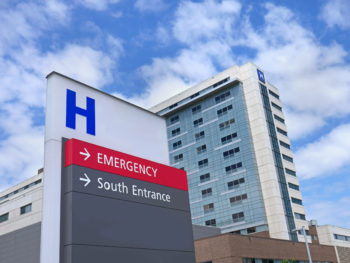About 70 percent of Georgia adults in a new survey report they had burdensome health care costs in the past year.
And an even higher percentage – 80 percent – are worried about being able to afford health care in the future.
The survey of more than 950 adults was conducted from April 12 to May 3 by Altarum, a nonprofit research and consulting organization.

Those cost concerns extended to respondents’ answers on what issues the government should address in the coming year. The top three cited were: 56% — health care; 51% —economy/joblessness; and 36% — immigration.
Even with more Georgians being insured, “we haven’t solved the affordability concerns,’’ said Laura Colbert, executive director of consumer advocacy group Georgians for a Healthy Future, which served as an adviser on the survey.
“People are very uncertain on how they’re going to maintain their coverage over the long run,’’ Colbert said Wednesday.
More than half (58%) of Georgia adults encountered one or more cost-related barriers to getting needed care during the prior 12 months. Their actions in response included cutting pills in half, skipping doses of medicine or not filling prescriptions, and some people simply did without certain care, such as by avoiding a prescribed medical test or not going to the dentist.
Affordability questions extend to all regions of the country, said Niall Brennan, president and CEO of the Health Care Cost Institute, a nonprofit research organization.
“Costs continue to careen out of control, rising at unsustainable rates,’’ he said Wednesday.

Drivers of high medical costs include consolidation among hospitals, which diminishes competition, he said.
“Most health care consumers are innocent bystanders in this spiraling cost scenario,’’ Brennan said.
Those with deductibles of $5,000 or $7,500 have severe affordability challenges, he said. “Every year, consumers pay a little more and get a little less’’ in terms of coverage.
And then they may get caught with a “surprise’’ medical bill. An unexpected bill from a health care provider, typically one who is not part of the consumer’s insurance network, can run into hundreds or even thousands of dollars.
For patients who have no health insurance, “treatment is costly and hence avoiding care is the most obvious route unless an emergency arises,’’ said Janani Thapa, health policy expert at the University of Georgia’s College of Public Health.

People with different types of health insurance have separate challenges, she added. Those with private coverage face high costs, and members of public programs such as Medicaid have trouble finding medical providers who will accept new patients, Thapa said.
Benefit plans can sometimes skimp on coverage for mental health problems and addiction, said Colbert, whose organization is holding a forum Thursday about affordability, access and public policy solutions .

Consumers in the survey blamed hospitals, drug companies and insurers equally for being a “major reason” for high health care costs.
The southwest and eastern regions of Georgia have higher affordability problems, the survey found.
At times, Georgia adults got the care they needed but had difficulty paying for it, with half of adults reporting that problem.
The problem of health care affordability affects families far up the income ladder, with over half (56%) of residents with household incomes of $100,000 or more struggling to afford their care in the past 12 months.
Over half of all survey respondents (55%) reported being either “somewhat worried” or “very worried” about affording the cost of prescription drugs.
Brennan, when asked whether there is hope for a leveling off of health care costs, said that “it remains to be seen. Presumably, society, consumers and employers will say, ‘This is enough.’ ”

